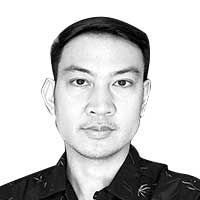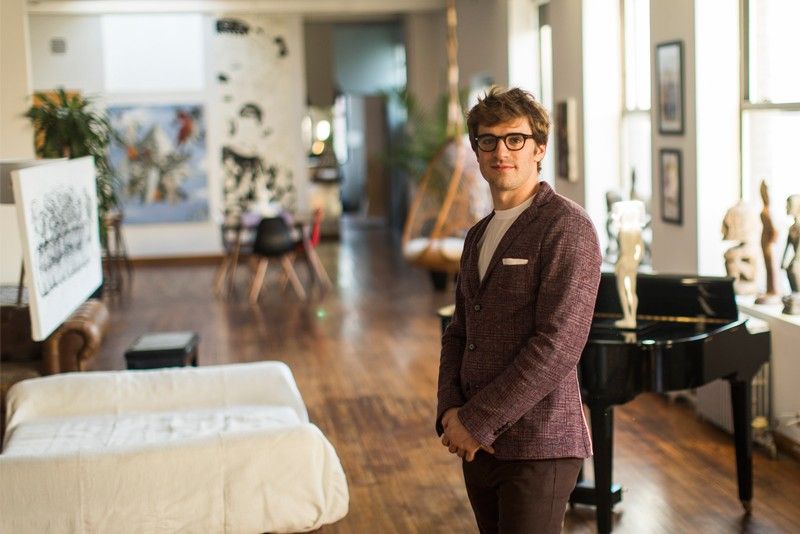His name is Luca, and he’s opening a door for Filipino art in New York City


New York-based Italian physician and scientist Luca Parolari is the director of Pintô International, the art organization founded by Dr. Joven Cuanang to help Filipino artists gain a foothold in the city that remains one of the most robust art capitals of the world.
Stocky, with a square face topped with a tumble of blond curls, the Italian, New York-based physician and scientist Luca Parolari is an unlikely champion of Filipino art in the Big Apple. But he assumes the role as a hand to a glove, organizing exhibitions, talks, and other cultural events that help introduce the works of talented Filipino artist to the city that remains as one of the most robust art capitals of the world.
Luca is the director of Pintô International, the latest venture of Dr. Joven Cuanang who, through Pintô Art Museum and Boston Gallery, has been a key figure in energizing and sustaining Philippine art, even back in the days when only the most cursory attention was paid to it. Just like Dr. Cuanang, Luca is a neuroscientist, delving into the folds and mysteries of the brain. And just like Dr. Cuanang, Luca is passionate about contemporary art.

Part gallery, part artist residence, part salon, Pintô NYC , located in East Village in New York, holds a bi-weekly conversation on different topics, ranging from artificial intelligence, to neuroscience, to technology, to anthropology, to history.
It all began when Luca came to the country for volunteering experience in a field hospital in the north upon the advice of his mentor professor at Harvard Medical School who told him: “You have to absolutely go to the Philippines.” Luca’s mentor also asked him to meet up with Dr. Cuanang, long considered a stalwart in the field of neuroscience.
“I never really considered working in art,” Luca states. “But Dr. Cuanang is an inspiring figure. He’s so full of positive of energy… He’s a big example, a very high standard to live up to.” Luca came back to New York armed with “the idea of helping artists gain exposure they deserve not only in the Philippines but abroad.”
When Dr. Cuanang was inducted to the board of Asian Cultural Council (ACC), “a foundation that is founded and funded by Rockefeller in New York that helps the cultural exchange between Asia and the US,” Luca and Dr. Cuanang decided to create a group show to help generate funds for the ACC grantees.
Held at Urban Zen in Greenwich Village, a boutique owned by the fashion designer Donna Karan, in May of last year, Pintô Manhattan Manila opened with a private preview of the works of 30 of the best Filipino contemporary artists. The event ran for 24 hours, allowing the free flow of ideas and wine, interspersed with Skype conversations with movers and shakers of Philippine art. All of the works got sold.
With this auspicious start, Pintô International is now humming merrily on course. Aside from setting up a website to help broadcast its activities, the art organization is also cooking up pop-up exhibitions in different parts of the globe. Upcoming shows are slated on June 19 in Tokyo, later this year at the refurbished residence of the Philippine Ambassador to the United Nations located in Fifth Avenue, and in 2019, in Milan, Italy and San Sebastian, Spain.

A work by Ferdie Montemayor located in one of the spaces of Pintô NYC .
Aside from these efforts, Luca proudly mentions Pintô NYC, “a permanent space in the East Village in New York…It’s very, very large. A lot of wall space, a lot of light in a prime position in the city.” Part gallery, part artist residence, part salon, the space is also an incubator of ideas where talks on various subjects — from artificial intelligence, to neuroscience, to technology, to anthropology, to history — can take place.
“I plan to organize a community that gravitates around the space,” Luca says. “When you try to transplant contemporary Filipino art and characterize it only as Filipino, you end up creating a community (composed of) expats, Filipinos—which is great. We’re not needed for that to happen. What we want to do is break away from this structure and have a space where the international community in New York can come and is attracted to it because it is fun, there’s interesting conversation going on, and meanwhile gets exposed to Filipino art.”
With the space inaugurated only last December, Luca is confident about the prospects of Pintô International. “We’re past the embryonic stage; we have delivered the baby,” he says. “The intention is to go as long as things work. If things work out very well, we keep on expanding and have the most promising artists use this as a platform. We’re open to whatever direction it’s going to take.”



















